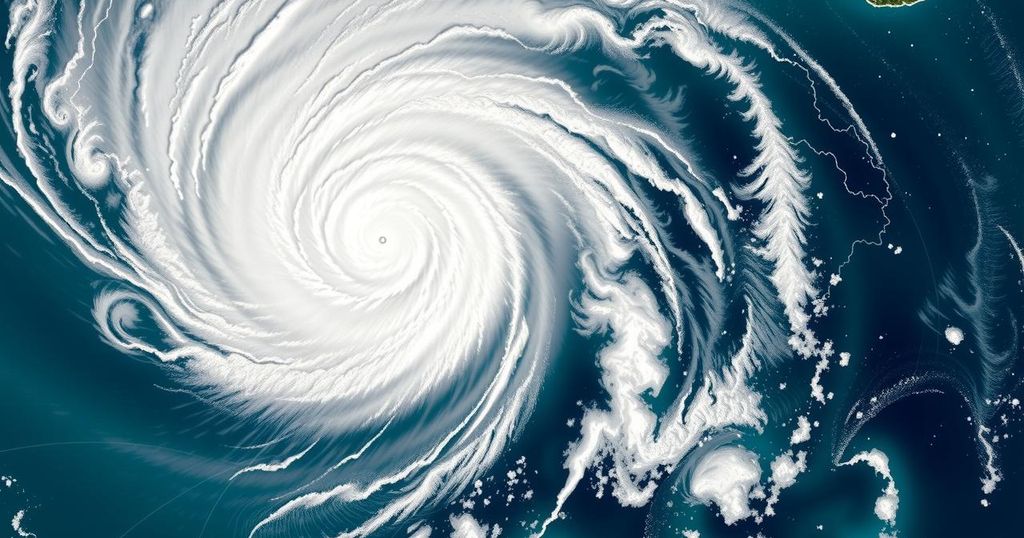Cyclone Chido Threatens Indian Ocean Islands and East African Coast

Cyclone Chido is approaching Comoros, Madagascar, and Mayotte, prompting red alerts and emergency measures. Authorities predict over 2 million people could be affected in Mozambique. Precautionary actions are being taken in Madagascar and Mayotte, with international assistance mobilized to mitigate potential damage and health impacts following the cyclone’s landfall.
The Indian Ocean islands of Comoros, Madagascar, and Mayotte are preparing for Cyclone Chido, which is rapidly approaching Africa’s eastern coastline. Authorities in Comoros have mandated the closure of schools, anticipating impact from the cyclone early Saturday, following its expected passage over the northern tip of Madagascar. The French territory of Mayotte is also in Chido’s path, prompting the French national weather service to issue a red alert, signifying the most critical level of warning.
On the African mainland, Mozambique has issued a similar red alert for the northern provinces of Cabo Delgado and Nampula, estimating that over 2 million people may be affected when Cyclone Chido makes landfall, which is anticipated on Sunday. The Mozambique National Meteorological Institute has warned of winds reaching 200 kilometers per hour (124 miles per hour). Ana Cristina, the director of the National Emergency Operations Center, indicated an initial assessment suggesting that approximately 2.5 million individuals may require rescue assistance in affected provinces.
In preparation, the Madagascar government disseminated alerts via cellphones and radio broadcasts, urging precautions and facilitating evacuations in the vulnerable northern region of Diana. Authorities estimate that nearly 20,000 people in this area could face significant risks.
The French government is mobilizing resources to assist Mayotte, deploying approximately 110 personnel, including emergency responders and firefighters, along with three tons of emergency supplies. This aid entails search dogs and specialists trained in rubble rescues, as emphasized by Col. Frédéric Leguillier, head of Mayotte’s fire and rescue service.
The cyclone season, spanning from December to March, has historically subjected the region to increasingly severe storms, raising concerns about the exacerbation of cyclones due to climate change. Past cyclones have resulted in significant casualties and damage, emphasized by events such as Cyclone Idai in 2019, which claimed over 1,300 lives across Mozambique, Malawi, and Zimbabwe. Furthermore, Crisis24 has highlighted the potential for severe flooding and landslides from Cyclone Chido, along with ensuing health risks from waterborne diseases, which were notably witnessed in the aftermath of Cyclone Idai.
As the Indian Ocean region enters its cyclone season, which runs from December through March, communities are increasingly vulnerable to natural disasters. Cyclone Chido’s projected path, impacting islands like Comoros, Madagascar, and Mayotte, raises alarm among residents and officials alike. Past experiences from previous cyclones, including Idai and Freddy, underscore the dire consequences of such storms, often exacerbated by climate change. Such conditions not only pose physical dangers from winds and flooding but also threaten public health through the spread of diseases following environmental changes post-cyclone.
In summary, the imminent arrival of Cyclone Chido poses substantial risks for the Indian Ocean islands and the East African mainland. Governments are taking proactive measures to ensure the safety of residents through alerts and the mobilization of emergency services. With past cyclone events demonstrating the severe impact of such storms, the region remains on high alert, focusing on disaster preparedness and public health safety, especially in light of rising concerns surrounding climate change effects on storm severity.
Original Source: abcnews.go.com




